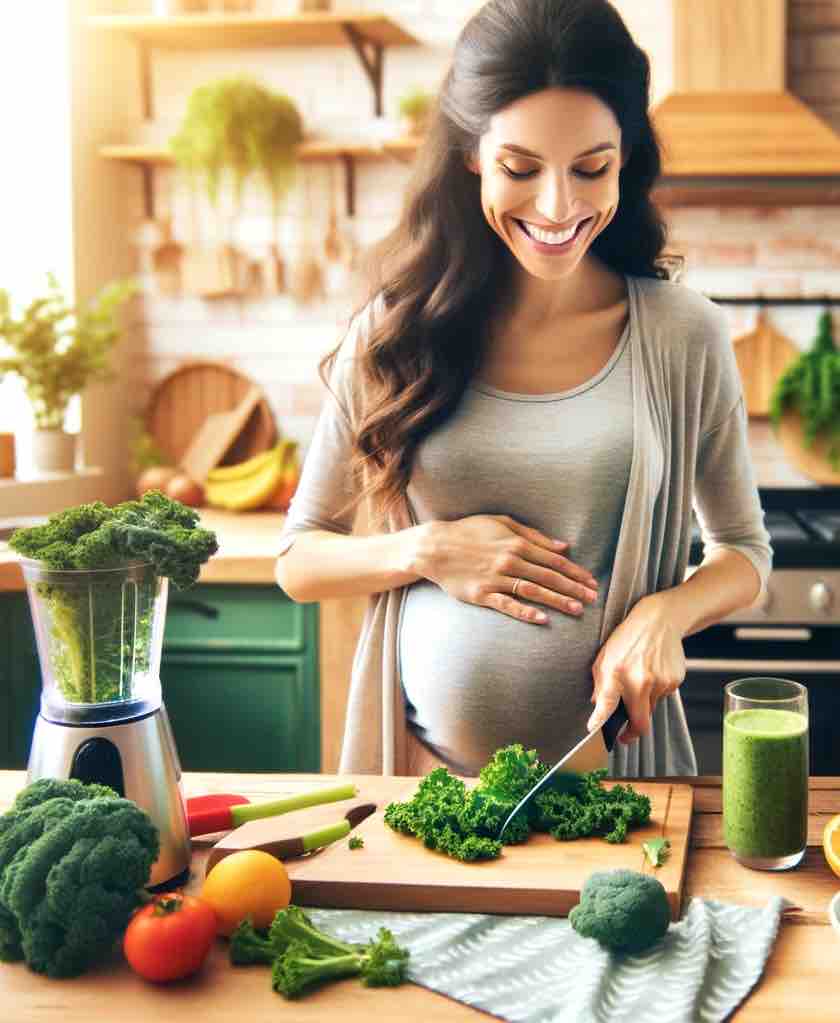
Navigating the Myths and Realities
In the world of ever-evolving dietary trends, the Paleo diet stands out for its unique approach, harking back to our ancestral eating habits. This diet, emphasizing whole foods like lean meats, fruits, vegetables, nuts, and seeds, while shunning grains, legumes, dairy, and processed foods, has garnered significant attention. But when it comes to pregnancy, a period marked by heightened nutritional needs and concerns, does the archaic wisdom of the Paleo diet hold up?
Pregnancy is a journey that transforms the body and mind, necessitating a careful balance of nutrients to support both the mother and the growing life within. The thought of adopting a diet based on our Paleolithic ancestors during this critical time might seem alluring – a natural, unprocessed way of eating that promises to cater to our most primal nutritional needs. But is this the whole truth?
This guide delves deep into the Paleo diet’s compatibility with pregnancy. We navigate through the complex labyrinth of nutritional science, debunking myths and uncovering facts. With expert insights and scientific research, we’ll explore the potential benefits and the often-overlooked risks of adhering to a Paleo diet during these crucial nine months.
The Paleo Promise: A Return to Origins
At first glance, the Paleo diet’s emphasis on natural, unprocessed foods appears to be a perfect match for pregnancy nutrition. The diet’s advocates tout its benefits – from high-quality protein sources for fetal development to an abundance of fruits and vegetables rich in essential vitamins and minerals. The absence of refined sugars and processed foods is another point in its favor, potentially reducing the risk of gestational diabetes and promoting overall health.
The Other Side of the Coin: A Closer Look at Risks
However, pregnancy is a time when nutritional needs are not just about quality but also about diversity and balance. The Paleo diet’s exclusion of whole food groups – namely grains, legumes, and dairy – raises important questions. Can a diet that omits these sources provide the necessary nutrients like calcium, iron, B-vitamins, and folate in adequate amounts? Is it possible to maintain a balanced macronutrient profile crucial for both the mother and the developing fetus?
In this comprehensive guide, we weigh the pros and cons, sifting through scientific evidence and expert opinions. We aim to provide expecting mothers with a clear, unbiased view of what a Paleo diet can and cannot offer during pregnancy. Whether you’re considering adopting this diet or simply curious about its implications, this journey through the Paleo landscape during pregnancy is designed to inform, enlighten, and guide.
Join us as we embark on this exploration, unraveling the complexities of the Paleo diet in the context of one of life’s most beautiful and challenging stages – pregnancy.
Understanding the Paleo Diet: A Deep Dive into Its Core Principles
Before delving into the Paleo diet’s implications during pregnancy, it’s crucial to fully grasp what this diet entails and why it has become a popular choice for many. The Paleo diet, often dubbed the ‘Caveman Diet’, is more than just a list of foods; it’s a philosophy harking back to the Paleolithic era, a time before agriculture and processed foods.
The Essence of Paleo: Back to the Basics
The Paleo diet is grounded in the idea of consuming foods that our ancestors presumably ate. This includes:
- Natural, Unprocessed Foods: Think vegetables, fruits, nuts, seeds, lean meats, and fish. These foods form the cornerstone of the Paleo diet, celebrated for their high nutrient density and absence of modern additives.
- Exclusion of Grains and Dairy: Grains and dairy, staples of the modern diet, are conspicuously absent in the Paleo paradigm. The rationale lies in the belief that our bodies are not optimally adapted to these food groups, which were introduced much later in human history.
- Focus on Quality Protein and Healthy Fats: The diet emphasizes high-quality protein sources like grass-fed meat and omega-3 rich fish. Healthy fats, such as those found in avocados and nuts, are also a key component.
The Paleo Debate: A Nutritional Perspective
The Paleo diet has its share of advocates and critics. Proponents argue that this diet, rich in whole foods and devoid of processed items, aligns closely with our genetic makeup, promoting better health and weight management. Critics, however, point out the potential nutritional gaps, especially concerning the exclusion of whole grains, legumes, and dairy.
The Paleo Diet in the Context of Pregnancy
Pregnancy is a time when nutritional adequacy becomes more critical than ever. The body’s requirements for certain vitamins and minerals increase significantly to support fetal development and maternal health.
Potential Benefits: Nutrient-Rich Choices for Mother and Baby
- Whole Foods for Holistic Nutrition: The emphasis on unprocessed foods means a high intake of vitamins, minerals, and antioxidants, which are beneficial for both the mother and the developing fetus.
- Protein and Healthy Fats: These are essential for the baby’s growth, particularly brain development. The Paleo diet’s focus on quality protein sources can be advantageous here.
- Low Sugar and Processed Foods: This aspect of the Paleo diet might help in managing or preventing gestational diabetes, a condition marked by high blood sugar during pregnancy.
Addressing the Concerns: The Flip Side of Paleo During Pregnancy
- Calcium and Vitamin D Deficiency: With dairy off the table, obtaining enough calcium and vitamin D, crucial for fetal bone development, becomes a concern.
- Iron and Folate Shortfalls: The absence of legumes and certain fortified grains could lead to deficiencies in iron and folate, essential nutrients for preventing anemia and supporting fetal growth.
- The Fiber Question: Whole grains, a primary source of dietary fiber, are excluded in the Paleo diet. Fiber is vital for digestive health, especially in managing the common issue of constipation during pregnancy.
Navigating the Paleo Path: Modifications for Pregnancy
Given these considerations, it’s clear that if one opts for a Paleo diet during pregnancy, certain modifications and careful planning are necessary. Here’s how to navigate it:
- Incorporating Essential Nutrients: This could mean adding non-Paleo items like dairy or fortified grains to ensure adequate intake of calcium, vitamin D, iron, and folate.
- Balanced Approach to Macronutrients: While protein is vital, ensuring a balanced intake of carbohydrates and fats is also crucial for the energy needs of pregnancy.
- Supplementation: Depending on individual nutritional needs, supplements like prenatal vitamins, calcium, or DHA might be necessary.
The Paleo diet during pregnancy presents a mixed bag of potential benefits and notable risks. It’s a diet that can offer a bounty of whole, unprocessed foods, rich in essential nutrients. However, its strict rules around grains, dairy, and legumes might lead to nutritional gaps, particularly concerning for pregnant women. The key lies in adapting and balancing this diet to meet the unique nutritional demands of pregnancy, always guided by healthcare professionals’ advice.
In the next section, we’ll explore practical meal ideas and tips for those considering or already following a Paleo diet during pregnancy, ensuring a healthy and balanced approach for both mother and baby.
Adapting the Paleo Diet for a Healthy Pregnancy: Practical Tips and Meal Ideas
While the Paleo diet has potential benefits, adapting it for pregnancy requires careful consideration to ensure both mother and baby receive all the necessary nutrients. Here, we explore practical ways to modify the Paleo diet and provide meal ideas that cater to the unique needs of pregnancy.
Incorporating Essential Nutrients
- Calcium and Vitamin D: Since dairy is excluded in the Paleo diet, alternative sources of calcium and vitamin D are necessary. Consider adding foods like dark leafy greens, fortified non-dairy milks (like almond or coconut milk), and fish with edible bones (like sardines).
- Iron and Folate: To compensate for the lack of legumes and certain fortified grains, focus on Paleo-friendly sources of iron and folate, such as spinach, beef, and liver. A prenatal vitamin supplement can also be beneficial.
- Fiber Intake: Include plenty of vegetables and fruits in your diet to maintain healthy fiber levels, crucial for digestive health during pregnancy.
Balanced Macronutrient Approach
- Proteins: Opt for a variety of lean meats, poultry, fish, and eggs to ensure a good protein intake.
- Carbohydrates: Incorporate starchy vegetables like sweet potatoes and butternut squash, as well as fruits, for a balanced carbohydrate intake.
- Fats: Avocados, nuts, and seeds are excellent sources of healthy fats.
Meal Planning and Recipes
- Breakfast Ideas: Start your day with a vegetable omelet, adding spinach and mushrooms for iron and folate. A smoothie with almond milk, berries, and a scoop of protein powder can also be a nutritious option.
- Lunch Options: Try a large salad with mixed greens, grilled chicken, avocado, and a variety of vegetables. For a heartier meal, a beef stir-fry with a medley of vegetables over cauliflower rice can be both satisfying and nutritious.
- Dinner Suggestions: Grilled salmon with a side of roasted sweet potatoes and steamed broccoli makes for a balanced meal. Another option is a slow-cooked stew with lean beef or lamb, carrots, and sweet potatoes.
Snacks and Cravings
- Healthy Snacks: For snacks, consider nuts and seeds, fresh fruit, or vegetable sticks with a Paleo-friendly dip like guacamole.
- Managing Cravings: If you’re craving something sweet, opt for a piece of fruit or a small serving of dark chocolate. For savory cravings, try kale chips or a small portion of homemade sweet potato fries.
Staying Hydrated
- Water Intake: Drinking plenty of water is essential during pregnancy. Aim for at least 8-10 glasses a day.
Listening to Your Body
- Individual Needs: Every pregnancy is unique. Pay attention to your body’s signals and cravings, as they can be indicative of your nutritional needs. If you find yourself consistently craving non-Paleo foods, it may be a sign to reassess your diet.
Consulting Healthcare Professionals
- Always consult with a healthcare provider before making any significant dietary changes during pregnancy. They can provide personalized advice and ensure that your diet meets all your nutritional needs.
Adopting a Paleo diet during pregnancy can be beneficial, but it requires careful planning and modification to meet the increased nutritional demands. By focusing on nutrient-rich foods, ensuring a balanced intake of macronutrients, and being open to dietary adjustments, you can maintain a healthy and enjoyable diet throughout your pregnancy. In the next section, we’ll discuss the importance of regular check-ups and how to monitor your health and your baby’s development while
Monitoring Health and Development During a Paleo Pregnancy
Importance of Regular Check-Ups
- Consistent Monitoring: Regular prenatal check-ups are crucial for monitoring both your health and your baby’s development. These appointments provide an opportunity to discuss your diet and make adjustments as needed based on medical advice.
- Tracking Nutritional Status: Blood tests can help track key nutritional indicators like iron, calcium, and vitamin D levels, ensuring you are meeting your pregnancy requirements.
Adjusting the Diet Based on Health Feedback
- Responding to Deficiencies: If blood tests indicate any nutritional deficiencies, you may need to adjust your diet accordingly. This might include incorporating more specific foods or considering supplements.
- Balancing Macros Based on Energy Levels: Listen to your body. If you feel fatigued, you might need to increase your intake of healthy carbohydrates or adjust your protein and fat ratios.
Understanding the Baby’s Development
- Fetal Growth Monitoring: Regular ultrasounds and check-ups will monitor the baby’s growth and development. Discuss with your healthcare provider how your diet might be impacting this aspect of your pregnancy.
Maintaining a Healthy Lifestyle
- Physical Activity: Along with a balanced diet, moderate physical activity is beneficial during pregnancy, unless otherwise advised by your healthcare provider.
- Mental Well-being: Pregnancy can be a stressful time. Practices like meditation, prenatal yoga, or simply taking time for relaxation can be beneficial for your mental health.
Preparing for Post-Pregnancy
- Postpartum Nutrition: Start planning for your post-pregnancy nutrition and how you might need to adjust your diet, especially if you plan to breastfeed.
Conclusion
A Paleo diet during pregnancy can be a healthy choice if carefully planned and monitored. Regular consultations with healthcare professionals, attentive monitoring of your nutritional status, and adjusting your diet based on the health of you and your baby are key to a successful Paleo pregnancy. Remember, each pregnancy is unique, and what works for one person may not work for another. The priority should always be the health and well-being of both the mother and the baby.
10 FAQs on Paleo Diet During Pregnancy
- Is it safe to follow a Paleo diet while pregnant?
- While a Paleo diet can be rich in fruits, vegetables, and lean protein, it may lack essential nutrients like calcium, iron, and folate due to the exclusion of dairy, grains, and legumes. It’s important to consult with a healthcare provider and possibly make modifications to ensure a balanced diet during pregnancy.
- Can the Paleo diet provide enough calcium during pregnancy?
- The Paleo diet excludes dairy, a major source of calcium. However, you can obtain calcium from other sources like leafy greens, fortified non-dairy milks, and fish with edible bones. Supplementation may also be recommended.
- How can I ensure I’m getting enough iron on a Paleo diet during pregnancy?
- Focus on iron-rich Paleo foods like red meat, spinach, and liver. Since the Paleo diet excludes fortified cereals and legumes, a common source of iron, supplementation might be necessary.
- Is the Paleo diet beneficial for managing gestational diabetes?
- The Paleo diet’s low sugar and processed food content might help in managing gestational diabetes. However, it’s important to consult a healthcare provider for a personalized diet plan.
- Can I get enough fiber on a Paleo diet during pregnancy?
- Although the Paleo diet excludes grains, you can still get fiber from vegetables, fruits, nuts, and seeds. It’s important to include a variety of these foods to meet your fiber needs.
- Are there any risks to my baby if I follow a Paleo diet while pregnant?
- The main risk is nutritional deficiencies due to the exclusion of certain food groups. These deficiencies can potentially impact fetal development. Regular check-ups and consultations with a healthcare provider are essential.
- How can I deal with food cravings while on a Paleo diet during pregnancy?
- For sweet cravings, opt for fruits or small portions of dark chocolate. For savory cravings, try Paleo-friendly snacks like nuts or homemade vegetable chips. Listen to your body and make modifications if needed.
- What are some Paleo-friendly sources of folic acid?
- While the Paleo diet excludes fortified grains, a common source of folic acid, you can find folate in foods like spinach, asparagus, and liver. A prenatal vitamin may also be necessary.
- Can following a Paleo diet postpartum affect breastfeeding?
- A well-balanced Paleo diet can support breastfeeding, but it’s crucial to ensure you’re getting enough calories and nutrients. Supplements and dietary adjustments might be needed.
- How can I modify the Paleo diet for a more balanced approach during pregnancy?
- Consider reintroducing some non-Paleo foods like dairy or grains to ensure a more balanced intake of essential nutrients. Consult a healthcare provider or a dietitian for personalized advice.
Blog Tags for the Post
Paleo Diet, Pregnancy Nutrition, Healthy Eating, Maternal Health, Gestational Diabetes, Prenatal Vitamins, Breastfeeding, Postpartum Diet, Balanced Diet, Pregnancy Wellness













